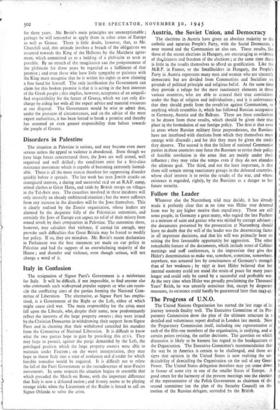Austria, the Soviet Union, and Democracy
The elections in Austria have given an absolute majority to the catholic and agrarian People's Party, with the Social Democrats a near second and the Communists an also ran. These results, like those of the recent elections in Hungary, are encouraging as evidence of thejairness and freedom of the elections ; at the same time there is little in the results themselves to afford us gratification. Like the M.R.P. in France, or the Smallholders in Hungary, the People's Party in Austria represents many men and women who are sincerely democratic but are divided from Communists and Socialists on grounds of political principle and religious belief. At the same time they provide a refuge for the most reactionary elements in those various countries, who are able to conceal their true convietions under the flags of religion and individualism ; and it is unfortunate that they should profit from the revulsion against Communism, or anything which resembles it, which has followed Russian occupation in Germany, Austria and the Balkans. There are three conclusions to be drawn from these results, which should be given their true place in the formulation of our foreign policy. The first is that even in areas where Russian military farce preponderates, the Russians have not interfered with elections from which they themselves must emerge with. discredit ; and for this they must be given the credit they deserve. The second is that the failure of national Communist parties in these countries may force the Russians to revise their policy of forcible revolution in the areas that are mainly under their influence ; they may relax the tempo even if they do not abandon the ultimate goal. The third, and not the least important, is that there still remain strong reactionary groups in the defeated countries, whose chief interest is to revise the results of the war, and whose existence is regarded, rightly, by the Russians as a danger to her future security.






























 Previous page
Previous page